Gaming controllers are transforming mental health therapy with specialized options for diverse needs. You’ll find the Xbox Adaptive Controller for motor skills development, PlayStation Access Controller for emotion regulation, Tobii Eye Tracker for nonverbal patients, Switch Adaptive Gaming Kit for anxiety management, voice-activated controls for mobility challenges, haptic feedback controllers for trauma processing, and brain-computer interfaces for neurotherapy. These innovative tools provide customizable experiences that enhance therapeutic outcomes through engaging, accessible technology. Discover how these controllers are creating breakthrough moments in therapy sessions worldwide.
XBOX Adaptive Controller: Customizable Therapy for Motor Skills Development
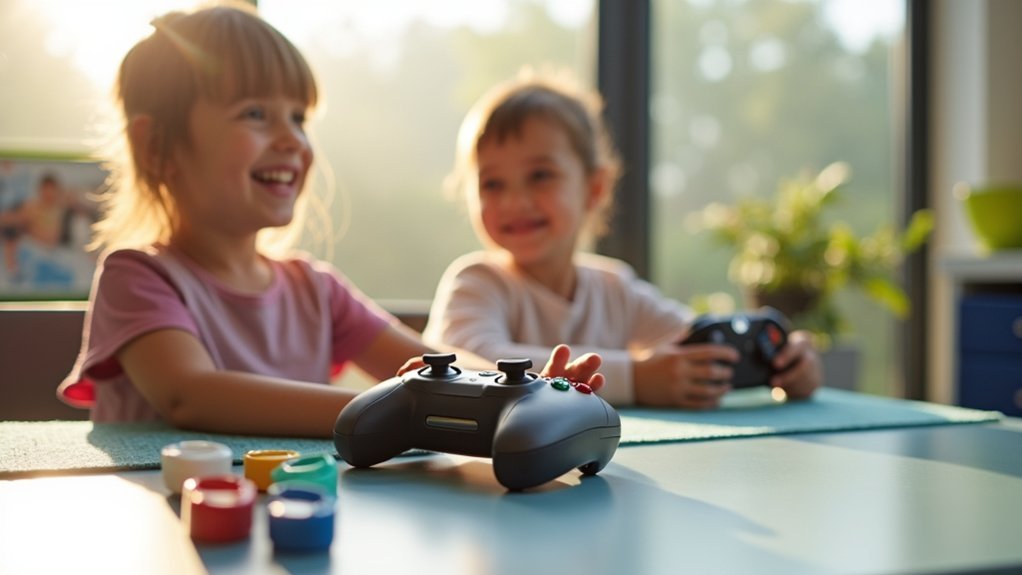
Innovation meets inclusivity with the Xbox Adaptive Controller, a groundbreaking device designed specifically for individuals with limited mobility. With its programmable buttons and flat base design, you’ll experience gaming tailored to your unique needs.
This controller transforms occupational therapy by targeting hand-eye coordination and dexterity through customizable inputs. You can connect various external devices through 3.5mm ports and USB connections, creating a personalized rehabilitation experience. For additional assistance, users can access Xbox Support resources to maximize their therapeutic setup.
The controller’s versatility supports your therapeutic journey with multiple profiles via the Xbox Accessories app. You’ll develop motor skills while enjoying an immersive gaming experience that reduces stress and builds confidence.
Whether you’re working on rehabilitation goals or simply wanting to join multiplayer communities, the Adaptive Controller breaks down barriers and fosters connection through accessible play.
PlayStation Access Controller: Personalized Interface for Emotion Regulation
The PlayStation Access Controller’s modular design allows you to create customizable emotional command panels that match your therapeutic needs.
You’ll find the controller’s various button options and profile management particularly helpful for implementing sensory regulation techniques during heightened emotional states.
The ability to switch between specialized profiles enables you to incorporate mindfulness mode features that can be activated instantly when you need to regulate your emotions during gameplay. The controller’s expansion slots for external peripherals further enhance therapy options by connecting additional devices tailored to specific emotional responses.
Customizable Emotional Command Panels
While traditional controllers often limit your emotional expression during gameplay, PlayStation’s Access Controller transforms this experience through its highly adaptable interface designed specifically for emotion regulation. The customizable emotional command panels let you create personalized responses to in-game situations. The ability to configure up to 30 individual control profiles enables therapists to create different emotional response settings for various treatment scenarios.
| Emotional Need | Controller Solution |
|---|---|
| Anxiety Relief | Larger, more accessible buttons reduce frustration |
| Empowerment | Remappable controls provide sense of control |
| Expression | Personalized layouts match emotional preferences |
| Therapeutic Value | Integrated joystick enhances therapeutic applications |
You’ll find the 10 remappable buttons particularly helpful for managing stress during gameplay. The modular design adapts to your specific needs, building confidence as you master games that were previously inaccessible. Mental health professionals are increasingly recognizing these customizable interfaces as valuable tools for emotional regulation therapy, making gaming both enjoyable and therapeutic.
Sensory Regulation Accessibility Features
Designed for sensory regulation excellence, PlayStation’s Access Controller offers an unparalleled suite of tactile features that can transform therapeutic gaming interventions.
You’ll appreciate the adjustable tactile feedback with interchangeable stick caps of different textures, helping clients ground themselves during emotional dysregulation. The immersive haptic feedback provides physical sensations that mirror emotional states in therapeutic exercises.
The controller’s modular design provides therapeutic customization options you won’t find elsewhere.
Position it in any orientation without holding it, reducing physical strain while clients focus on emotional processing tasks.
- Create up to 30 different control profiles for various therapeutic exercises or client needs
- Integrate tactile rubber icons that provide sensory feedback for emotion identification
- Adjust button resistance to match clients’ comfort levels during high-stress moments
- Mount the controller on any surface, creating consistent therapeutic environments
Mindfulness Mode Implementation
Implementing mindfulness mode on the PlayStation Access Controller revolutionizes emotion regulation therapy by creating a personalized interface that responds to each client’s unique needs.
You’ll experience unprecedented control over your therapeutic gaming environment through extensive button mapping and adaptive input options.
The controller’s toggle and hold functions can be tailored to support emotional expression exercises, reducing anxiety through simplified commands. This customization creates a sense of agency that’s essential for effective mental health interventions.
You can design dual-controller setups specifically for mindfulness practices, where complex actions become accessible through intuitive inputs.
By pairing these customization features with mindfulness-focused games, you’re creating a powerful therapeutic tool that reduces stress while enhancing emotional regulation.
The circular design with customizable buttons and large analog stick makes the controller particularly suitable for users with varying physical capabilities, expanding accessibility in therapeutic settings.
The controller’s adaptability transforms gaming from mere entertainment into structured mental health support with measurable psychological benefits.
Tobii Eye Tracker Integration: Revolutionary Tool for Nonverbal Patients
For patients unable to communicate verbally, the Tobii Eye Tracker represents a groundbreaking advancement in mental health therapy. This non-invasive technology captures subtle eye movements, providing clinicians with valuable insights into cognitive functions and emotional responses without requiring verbal feedback.
You’ll find the integration particularly transformative for patients with ASD, enabling personalized interventions that were previously impossible:
- Watch your nonverbal child engage with therapy for the first time through eye movement alone
- Experience the relief of seeing real-time data confirm your loved one is responding to treatment
- Celebrate measurable progress tracked over time that proves therapy is working
- Witness the newfound confidence as patients gain control over their communication abilities
The technology serves as a powerful objective biomarker that can be linked to various neurological and psychiatric conditions, allowing for more accurate diagnosis and treatment planning.
Switch Adaptive Gaming Kit: Inclusive Design for Anxiety Management
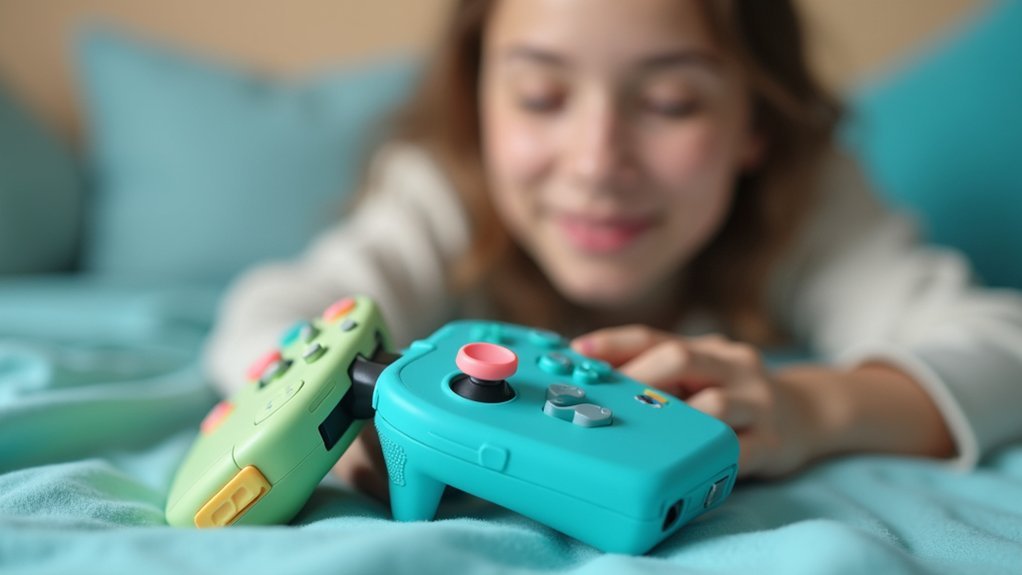
The Switch Adaptive Gaming Kit emerges as a transformative tool in anxiety management therapy, blending inclusive design with therapeutic potential. Working seamlessly with devices like the Xbox Adaptive Controller, this kit offers customizable configurations that can be tailored to each patient’s specific needs. The kit includes high performance, durable buttons and triggers designed specifically for the Xbox Adaptive Controller that enhance therapeutic consistency during sessions.
| Therapeutic Benefits | Implementation Features |
|---|---|
| Personalized anxiety management | 12 plug-and-play buttons |
| Increased engagement motivation | Mechanical switches for consistency |
| Social interaction opportunities | Variable trigger options |
| Positive reinforcement framework | Rigid and flexible mounting boards |
You’ll find the kit particularly valuable in clinical settings where patients can build resilience through controlled challenges. Its accessibility features—developed with specialized organizations—ensure that therapy sessions become more inclusive, allowing you to create structured engagement opportunities while strengthening the therapeutic alliance.
Voice-Activated Controls: Breaking Barriers for Mobility-Challenged Therapy Participants
Voice-activated controls represent a breakthrough advancement in mental health therapy, specifically benefiting patients with mobility challenges who can’t use traditional controllers.
These systems leverage AI technology to provide accessible therapy options that reduce barriers while remaining cost-effective. AI tools can analyze speech patterns to detect mental health conditions, particularly depression which manifests physically through flat tone and pauses.
AI-powered therapy solutions break down accessibility barriers without breaking the bank
You’ll find these technologies appearing in various forms, from conversational agents like Woebot delivering CBT support to AI systems that analyze voice patterns to detect signs of depression or anxiety.
Early intervention through these tools has shown promising results in symptom reduction.
- Feel empowered as you navigate therapy sessions using just your voice
- Experience the comfort of personalized care tailored to your specific needs
- Connect with therapeutic support without the stigma of traditional services
- Witness your mental health improve through consistent, accessible engagement
Haptic Feedback Controllers: Sensory Integration for Trauma Processing
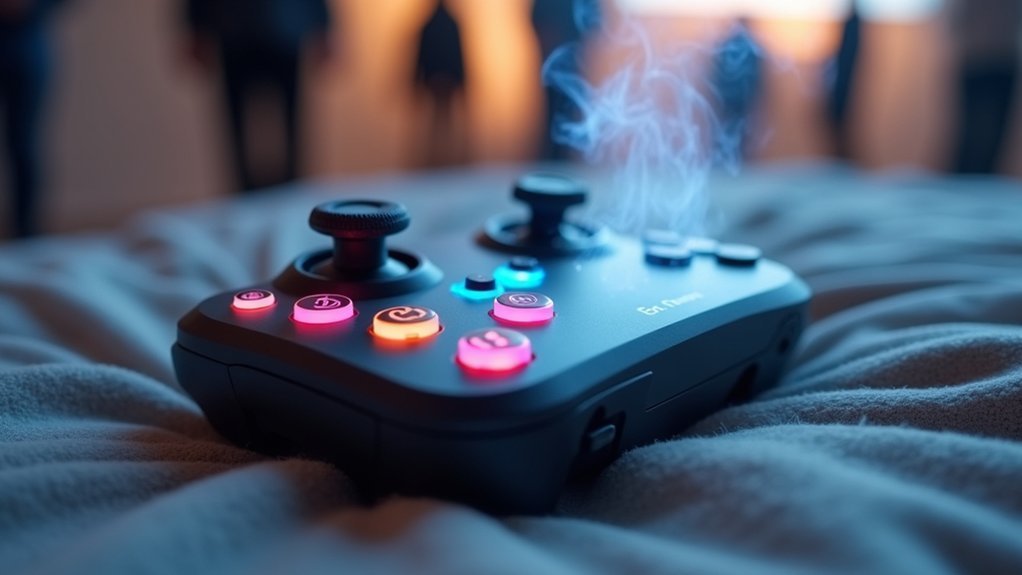
Haptic feedback controllers offer powerful grounding tools through physical sensations that help you reconnect with your body during trauma processing.
You’ll find these controllers enhance somatic therapy by providing targeted vibrations and pressure that simulate therapeutic touch, creating safe opportunities to process difficult memories.
The real-time tactile interventions can transform trauma reprocessing by engaging your sensorimotor system while simultaneously monitoring physiological responses like heart rate, giving both you and your therapist immediate feedback during therapy sessions. These controllers effectively complement traditional relaxation techniques that aim to reduce neurological arousal and promote calmness.
Grounding Through Physical Sensation
Physical sensation provides a powerful anchor when the mind drifts into trauma-induced dissociation or anxiety. Haptic feedback controllers deliver precise vibrations, pressure, and tactile stimuli that immediately connect you to the present moment.
These devices actively modulate your autonomic nervous system, helping regulate your body’s stress response during difficult therapy sessions or everyday triggers. Modern wearable technologies leverage multi-sensor systems to detect anxiety manifestations before they overwhelm the user.
- Feel the gentle vibration against your skin as anxiety rises, reminding you that you’re safe in the present
- Experience real-time relief as your racing heart steadies when the controller responds to your physiological signals
- Reclaim control over your body’s responses with customized sensory input during flashbacks
- Transform abstract grounding techniques into tangible sensations you can rely on anywhere
Trauma Memory Reprocessing Tools
When processing traumatic memories, your brain needs precise tools that engage multiple senses simultaneously. Haptic controllers offer a promising frontier in trauma therapy by providing controlled tactile feedback during memory reprocessing.
Though research in this area is still emerging, these devices create immersive experiences that could enhance traditional trauma therapy approaches. The vibrotactile feedback mimics real-world sensations in a controlled environment, potentially supporting sensorimotor integration during therapy sessions.
Modern haptic systems integrate with VR technology, allowing you to engage with traumatic memories in a multisensory yet safe context. The customizable nature of haptic feedback means therapists can adjust intensity based on your specific needs and therapeutic goals. This individualized approach aligns with evidence showing haptic technology’s flexibility in accommodating various therapeutic environments.
While more clinical studies are needed, these portable, accessible tools represent an innovative direction in personalized trauma treatment.
Somatic Therapy Enhancement
Somatic therapy harnesses the body-mind connection to process trauma, and haptic controllers elevate this approach to new therapeutic heights. These innovative tools provide precise sensory feedback that enhances your awareness of bodily sensations, a cornerstone of effective trauma processing.
When integrated with Somatic Experiencing techniques, haptic controllers create immersive environments where you can safely explore and release stored trauma responses. The closed-loop feedback systems in modern devices offer therapists unprecedented precision in guiding your interoceptive awareness. The latest haptic systems utilize SPA-skin technology capable of withstanding large multiaxial strains while providing high-frequency tactile feedback.
- Feel the gentle vibration that grounds you during overwhelming flashbacks
- Experience the rhythmic pulses that sync with your breathing exercises
- Sense the gradual pressure changes that help regulate your nervous system
- Engage with customized tactile patterns designed for your specific trauma responses
Clinical trials consistently show these integrative approaches reduce anxiety and improve therapeutic outcomes.
Brain-Computer Interface Controllers: The Future of Neurotherapy Applications
Revolutionary in scope and application, Brain-Computer Interface (BCI) controllers are fundamentally transforming neurotherapy by creating direct pathways between the brain and external devices.
You’ll find these technologies particularly promising for treating Parkinson’s disease, stroke recovery, and spinal cord injuries.
With projected market growth reaching $3.1 billion by 2030, BCI controllers are becoming increasingly accessible through non-invasive systems.
The integration of AI and machine learning enhances their effectiveness, allowing for real-time feedback through closed-loop systems that continuously adjust to your brain’s responses.
While clinical studies demonstrate impressive results in restoring motor function and improving communication in ALS patients, challenges remain in establishing standardized protocols and addressing ethical concerns.
Healthcare providers are increasingly implementing personalized neurofeedback technologies to enhance patient rehabilitation outcomes.
As this technology evolves, you’ll see BCIs expanding beyond medical applications into gaming, virtual reality, and enhanced human-machine interaction.
Frequently Asked Questions
How Much Training Do Therapists Need to Implement Controller-Based Therapy?
To implement controller-based therapy, you’ll need extensive training including a graduate degree, 3,000 supervised clinical hours over 2-6 years, specialized controller training programs, and ongoing continuing education to maintain your proficiency and certification.
Are Insurance Companies Covering Controller-Based Mental Health Interventions?
Insurance companies are beginning to cover controller-based interventions, but coverage varies widely. You’ll find more consistent coverage starting in 2025 when strengthened mental health parity regulations take full effect.
What Age Groups Benefit Most From Controller-Based Therapy Approaches?
You’ll find benefits across all ages. Children gain from play-based motor skill development, young adults connect with familiar technology, and older adults improve cognitive function. Each group experiences increased motivation and customized therapeutic approaches.
Can Controllers Trigger Adverse Reactions in Trauma or Anxiety Patients?
Yes, controllers can trigger adverse reactions in trauma or anxiety patients. You’ll need careful monitoring as they may cause psychological distress, flashbacks, or heightened anxiety in vulnerable individuals with PTSD or anxiety disorders.
How Do Therapy Outcomes Compare Between Traditional and Controller-Based Approaches?
Traditional therapies offer stronger symptom reduction and higher remission rates (36% vs. 15% in controls), while controller-based approaches provide better accessibility. You’ll likely see quicker initial results with traditional therapy but greater convenience with digital options.
In Summary
You’ve seen how gaming controllers are transforming mental health therapy in ways we couldn’t imagine before. Whether you’re overcoming trauma, managing anxiety, or working through motor challenges, there’s now a device that meets your needs. As technology continues to evolve, you’ll find even more innovative tools designed to help you heal and grow. The future of therapeutic technology isn’t just promising—it’s already here.

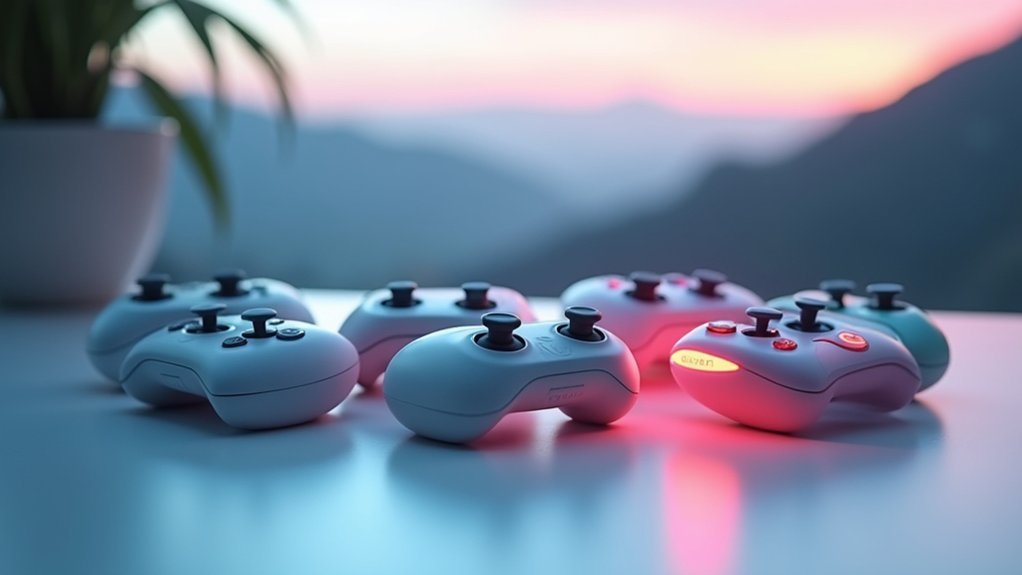
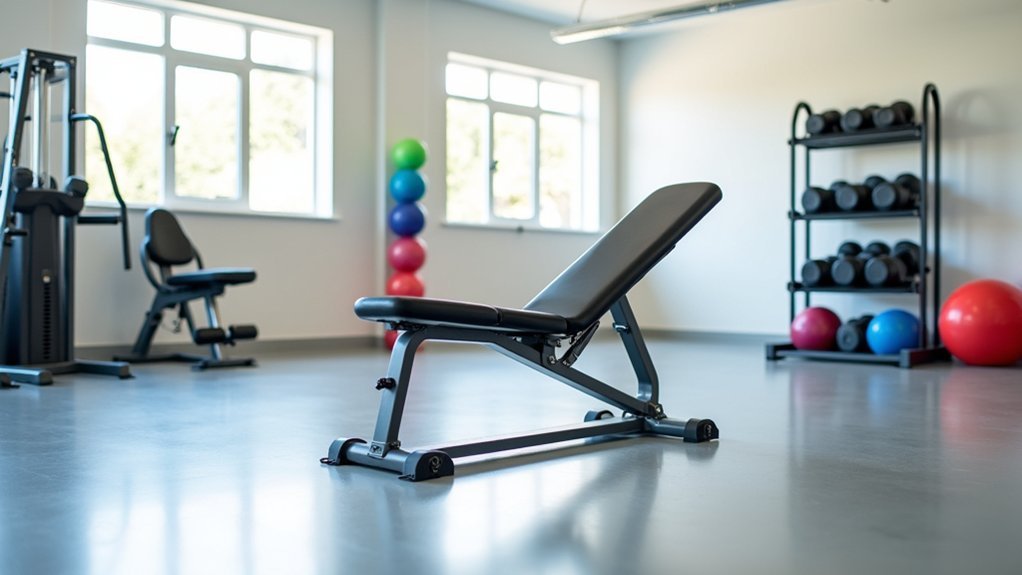
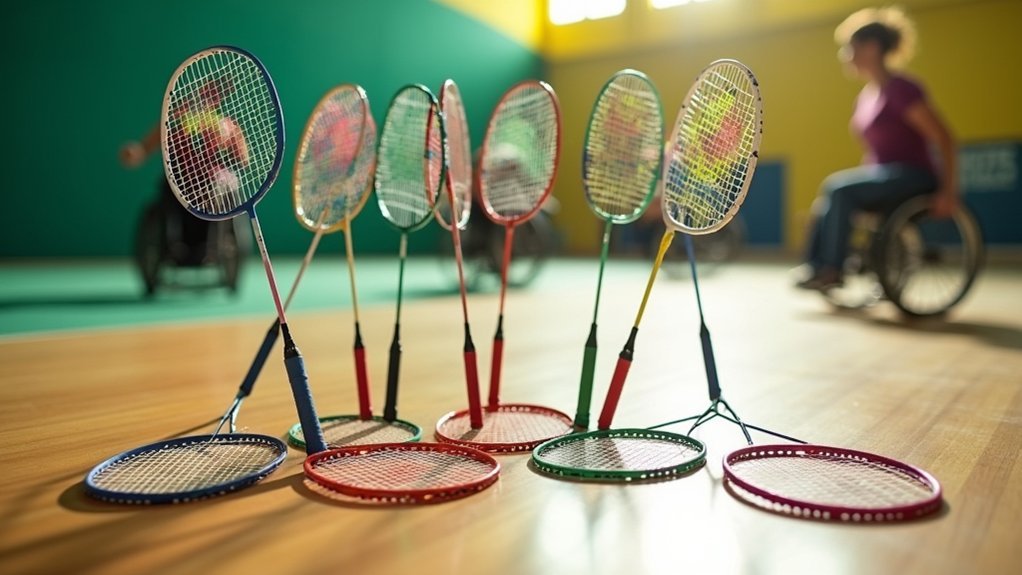

Leave a Reply